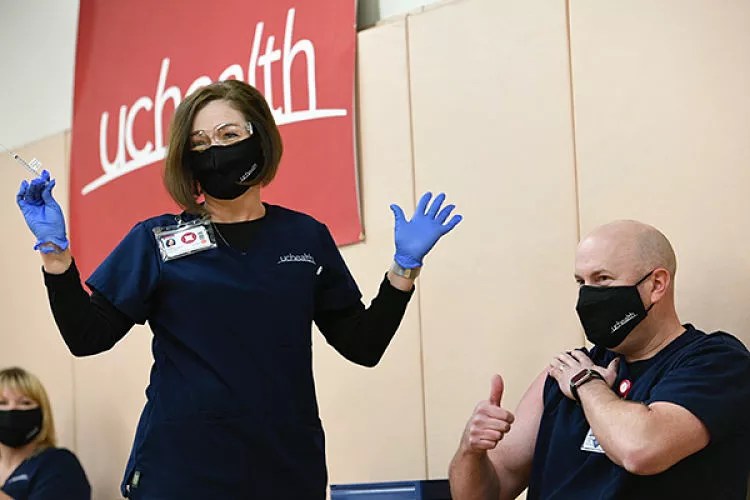
Photo by Chuck Bigger for UC Health

Audio By Carbonatix
The COVID-19 pandemic continues to be one of the most significant challenges our country has ever faced. As a nurse practitioner working on the front line, I’ve seen firsthand how this pandemic has overwhelmed many local hospitals.
The U.S. vaccine rollout hasn’t been perfect, but states and cities have worked to ramp up distribution and make sure vaccines don’t expire. Now they’re worried the distribution could get ahead of the supply. Some health-care providers and cities say they are running out of doses within a few days of getting their weekly allocation, a change from a couple of weeks ago, when local vaccinators had trouble keeping up with the supplies they were getting.
COVID-19 vaccines were always going to be in short supply after receiving U.S. approval for emergency use only in December, but patients, hospitals and local officials say even the meager allocation has been unpredictable. Although the inauguration of President Joe Biden promised an impending shake-up in federal coordination of the vaccine rollout, states and cities likely won’t be able to count on an immediate increase in supply. The number of vaccine doses being shipped has remained relatively flat since late December; vaccine-makers Moderna and Pfizer-BioNTech are scheduled to ship about 8.6 million doses next week, split evenly between those set aside for first shots and second shots, according to the U.S. Department of Health and Human Services.
But even once our supply is more robust, Denver health officials do not have a plan on how to get the vaccines into people’s arms other than utilizing local clinics.
While the county has designated several clinics to oversee vaccinating Denver County residents, we anticipate a critical need for trained staff to administer the vaccine. Furthermore, though the county plans to have these vaccination sites available seven days a week, what is really needed is to have these open 24/7 to vaccinate as many residents as possible and accommodate those who work odd hours or have multiple jobs.
Here I offer a solution: nurses!
Nurses are involved in the clinic distribution plan, but I urge our county officials to reach out to nurses by creating a county volunteer emergency personnel registry, and encouraging nurses to sign up. Working with the Colorado Board of Nursing, our county officials could efficiently recruit nurse volunteers to provide the workforce needed in these vaccination centers.
Many of us are willing to stand up, respond to this call to action, and help our nation meet the vaccination goal – but we need the opportunity to do so. Nurses can get those vaccines out of freezers and into arms!
The Biden administration’s incoming objective was to vaccinate more than 100 million people by May 1. Unfortunately, we are already behind. Nurses can help address this problem. Nurses can be mobilized to provide the COVID-19 vaccines to our residents, ensuring that the vaccines are given promptly, safely and equitably, especially to high-risk populations. Nurses have done it before. Both the 1947 smallpox epidemic in New York and the 2009 H1N1 pandemic saw mass vaccination responses in which public health nurses played pivotal roles, implementing clinics and optimizing planning and operations. Nurses can do this again!
All nurses are licensed to give shots. Public health nurses are more broadly trained and have a proven track record in planning and implementing public health campaigns. We have seen it before when nurses have been involved in addressing HIV and syphilis outbreaks in Denver County! Nurse educators across our region train nursing students to administer injections, and these students welcome the opportunity to practice their skills. Retired nurses also have a wealth of experience and expertise to offer. With minimal just-in-time training necessary about the unique guidelines for managing COVID-19 vaccine distribution, they can be quickly mobilized in Denver.
Nurses are well-equipped to follow established COVID vaccine guidelines, organize the immunization registry process, assist in the coordination and setup of county vaccination sites, and help educate the public about the vaccine. As members of the most trusted profession, nurses can communicate effectively and advocate for mass vaccination to reach the goal, moving us closer to the overarching objective of 100 million Americans vaccinated by May 1.
Randall McDavid, MS, FNP-BC, NP-C, AAHIVS, is Director of Medical Services for Colorado Health Network.
Westword publishes op-eds and essays on matters of interest to the Denver community on weekends. Have one you’d like to submit? Send it to editorial@westword.com, where you can also comment on this piece.